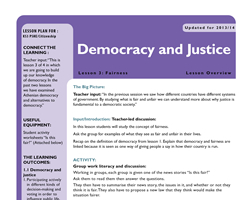New to Safeguarding Essentials?
Subscribe Now
|
Existing members
Sign in
here
Citizenship Lesson Plans / KS3 - Democracy - 4 lessons / Democracy Lesson Plan 3 - Fairness
There are 1 Documents available to download for
Democracy Lesson Plan 3 - Fairness
How does the concept of fairness relate to democracy and lawmaking? Students use controversial case studies to explore this issue.

- TRS Citizenship Democracy Lesson 3 PDF Downloads = 64
Connect the Learning
Teacher input:“This is lesson 3 of 4 in which we are going to build up our knowledge of democracy. In the past two lessons we have examined Athenian democracy and alternatives to democracy.”
The Big Picture
Teacher input:
“In the previous session we saw how different countries have different systems of government. By studying what is fair and unfair we can understand more about why justice is fundamental to a democratic society.”
The Learning Outcomes
From the key stage 3 Citizenship programme of study:
1.1 Democracy and justice
1.Participating actively in different kinds of decision-making and voting in order to influence public life.
2.Weighing up what is fair and unfair in different situations, understanding that justice is fundamental to a democratic society and exploring the role of law in maintaining order and resolving conflict.
3.Considering how democracy, justice, diversity, toleration, respect and freedom are valued by people with different beliefs, backgrounds and traditions within a changing democratic society.
4.Understanding and exploring the roles of citizens and parliament in holding government and those in power to account.
Input/Introduction
Teacher-led discussion:
In this lesson students will study the concept of fairness.
Ask the group for examples of what they see as fair and unfair in their lives.
Recap on the definition of democracy from lesson 1.
Explain that democracy and fairness are linked because it is seen as one way of giving people a say in how their country is run.

